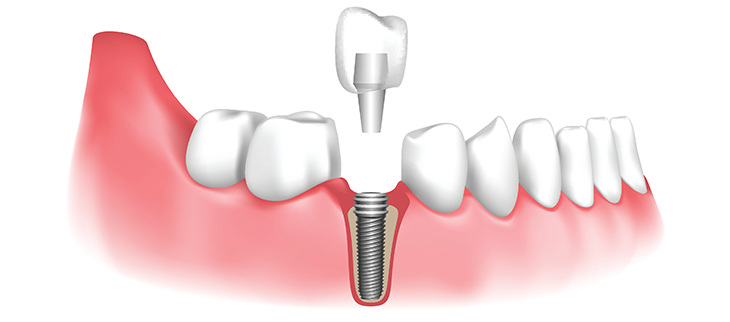Is root canal usually painful? Root canal treatment is a dental procedure that aims to remove infected or damaged tooth pulp. Many patients are apprehensive about undergoing root canal treatment due to fear of pain. In this article, we will discuss whether root canal treatment is typically painful and debunk some common myths surrounding the procedure.
Understanding the Connection Between Root Canal and Dental Implants: Addressing the Pain Myth.
Understanding the Connection Between Root Canal and Dental Implants: Addressing the Pain Myth.
Root canal treatment and dental implants are two different dental procedures that are often misunderstood. Some people believe that dental implants are painful and root canal therapy is a better option. However, this is not entirely true.
Dental implants are a popular choice for replacing missing teeth. The implant is surgically placed into the jawbone where it acts as an anchor for the replacement tooth. It is made of titanium, which is biocompatible with the body, and over time, fuses with the jawbone to create a permanent and stable foundation for the replacement tooth.
Root canal treatment, on the other hand, is a procedure that is performed to save a tooth that has become infected or damaged. During a root canal, the dentist removes the infected or damaged pulp from the tooth and fills it with a filling material to prevent further infection. Root canal therapy is typically recommended when the tooth can be saved and there is enough healthy tooth structure remaining.
Addressing the Pain Myth: One of the biggest misconceptions about dental implants is that they are painful. However, the truth is that dental implant surgery is a relatively painless procedure that is performed under local anesthesia. The discomfort associated with dental implants is usually minimal and can be managed with over-the-counter pain medications.
Similarly, root canal treatment has also been associated with pain. However, advancements in anesthesia and technology have made the procedure virtually pain-free. In fact, most patients report feeling little to no pain during their root canal treatment.
In conclusion, while there may be some misconceptions about dental implant surgery and root canal treatment, both procedures are safe and effective ways to restore your smile. By understanding the connection between these two procedures, you can make an informed decision about which option is right for you.
How long will the pain from a root canal last?
The pain after a root canal procedure can vary from person to person. Most patients experience some degree of discomfort or soreness for a few days after the treatment. It is normal to experience mild to moderate pain for up to a week after the procedure. The discomfort can usually be managed with over-the-counter pain relievers, such as ibuprofen or acetaminophen. If the pain persists or becomes severe, you should contact your dentist or endodontist immediately. In some cases, a follow-up appointment may be necessary to ensure proper healing of the tooth. However, once the root canal procedure is complete and the tooth has healed, the pain should subside completely, and the tooth should feel much better than it did before the treatment. If you experience any unusual symptoms or have concerns about the healing process, be sure to consult with your dental professional.
On a scale of 1 to 10, how much pain is experienced during a root canal?
The pain experienced during a root canal procedure is usually minimal to moderate, with most patients reporting only mild discomfort. The level of pain can vary depending on the individual’s pain tolerance and the complexity of the procedure. In fact, many people describe the pain of a root canal as being similar to that of getting a filling. It’s also important to note that anesthesia is always used during a root canal to numb the area and minimize any potential pain. Additionally, post-procedure pain can be managed with over-the-counter pain medications or prescription medication if necessary. Overall, while a root canal may not be the most pleasant experience, the pain associated with it is typically manageable and temporary.
Is the pain from a root canal tolerable?
The pain from a root canal procedure is generally manageable and tolerable. Most patients report feeling some discomfort during the procedure itself, but this can be managed with local anesthesia. After the procedure, there may be some mild to moderate pain and swelling, but this can typically be managed with over-the-counter painkillers like ibuprofen or acetaminophen. In rare cases, patients may experience more severe pain or complications, but these are uncommon and can usually be treated by a dental professional. It’s important to follow any post-procedure care instructions provided by your dentist to ensure a smooth and comfortable recovery. Overall, while a root canal procedure may sound intimidating, the pain associated with it is generally tolerable and manageable.
What is the reason for root canals requiring two visits?
Root canals typically require two visits because it takes time for the inflammation and infection to subside after the initial treatment. During the first visit, the dentist or endodontist will remove the infected or damaged pulp, clean the root canal system, and fill the space with a temporary filling. The second visit is necessary to ensure that the infection has been completely eliminated and to place a permanent filling or crown on the tooth to restore its function and appearance. In some cases, an additional visit may be required if the tooth requires additional restoration or if complications arise during the healing process. While two visits may seem inconvenient, proper treatment is critical to ensuring the long-term success of the root canal and preserving the tooth.
Frequent Questions
How can dental implants be used to replace a root canal procedure?
Dental implants can be used to replace a root canal procedure in cases where a tooth is severely damaged or decayed. While a root canal removes the infected pulp from inside the tooth, it does not address the structural damage that may have occurred. In some cases, a root canal may also weaken the tooth, making it more susceptible to breakage.
A dental implant replaces both the root and crown of a missing tooth, providing stable support and preventing surrounding teeth from shifting out of place. The process involves inserting a small titanium post into the jawbone, which fuses with the bone over time. A custom-made crown is then attached to the post, creating a natural-looking and fully functional replacement tooth.
Overall, dental implants offer a long-lasting and effective alternative to root canal procedures for patients with severely damaged or decayed teeth. It’s important to discuss your options with your dentist to determine the best course of treatment for your individual needs.
Are dental implant procedures less painful than traditional root canals?
Dental implant procedures are typically less painful than traditional root canals. This is because dental implants involve inserting a small titanium post into the jawbone to replace the missing tooth, while root canals involve removing infected tissue from the inside of a tooth.
While there may be some discomfort during and after the implant procedure, this can usually be managed with over-the-counter pain medication. Additionally, dental implants tend to have a shorter recovery time than root canals, allowing patients to return to their daily activities more quickly.
However, it’s important to note that every patient’s experience may vary depending on their individual circumstances and pain tolerance. It’s best to discuss any concerns with your dentist or oral surgeon before undergoing any dental procedure.
What types of pain management options are available for patients undergoing dental implant or root canal procedures?
Pain management is an important consideration for patients undergoing dental implant or root canal procedures. Anesthesia is the primary pain management option during these types of procedures. Local anesthesia, such as lidocaine, is injected into the gums and surrounding tissue to numb the area. This ensures that the patient feels no pain during the procedure. In addition to local anesthesia, sedation can also be used to help patients relax and alleviate any associated anxiety. Sedation can be administered in several forms, including oral medication, nitrous oxide, or intravenous (IV) medication. Post-procedure, over-the-counter medications such as ibuprofen or acetaminophen may be recommended to manage any residual discomfort. It is important for patients to communicate with their dentist or oral surgeon regarding any concerns they may have about pain management options during these types of procedures.
The root canal treatment, despite its reputation, usually does not cause a great deal of pain. Thanks to modern anesthesia techniques and advanced technologies, most patients report experiencing little to no discomfort during the procedure. While it’s understandable to feel apprehensive about undergoing a root canal, it’s important to remember that this treatment is common and routine in the world of dental implants. By partnering with an experienced implant dentist and following their post-treatment guidelines carefully, you can enjoy a restored smile that lasts for years to come. So if you’re dealing with dental pain or sensitivity, don’t hesitate to reach out to your dentist and schedule a consultation today!



